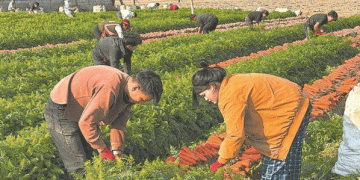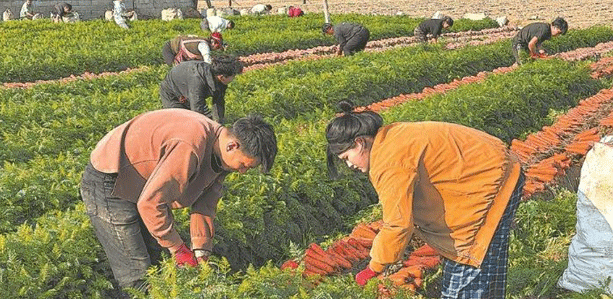In the mid-spring of 2025, the carrot fields of Tingfeng Village in Beigao Town, Licheng District, Putian City, are abuzz with activity. Dozens of workers are engaged in harvesting and transporting vibrant orange carrots destined for international markets. These fresh carrots are shipped via cold chain logistics to countries including Japan, Russia, and Malaysia, reflecting the region’s growing prominence in the global carrot trade.
The coastal geography of Beigao Town offers naturally sandy loam soils, ideal for carrot cultivation. Recognizing this advantage, the Lüdou Vegetable Cooperative has developed over 30 hectares of standardized, pollution-free carrot farms in villages like Tingfeng and Jiangbian. By integrating Internet of Things (IoT) monitoring systems, the cooperative ensures full traceability from seed to shipment, enhancing consumer trust and meeting stringent international quality standards.
The cooperative’s chairman, Chen Jiaxiong, highlights the adoption of the “Sakata” carrot variety, known for its uniform size and sweet, crisp taste. This variety, combined with mechanized farming practices encompassing soil preparation, ridge formation, and water-fertilizer management, has led to impressive yields of 112.5 tons per hectare—a 25% increase over traditional methods. Such productivity surpasses global averages, where yields typically range from 20 to 60 tons per hectare, depending on farming practices and varieties used .
Moreover, the cooperative strictly adheres to the production standards set by China’s Ministry of Agriculture and Rural Affairs. Their carrots have earned China’s green food certification and meet the European Union’s pesticide residue standards, facilitating smooth entry into overseas markets.
China’s position as the leading carrot exporter in Asia is well-established, with over 1.5 million metric tons exported in 2020, valued at $500 million . Putian’s advancements in carrot production and export strategies exemplify the country’s commitment to maintaining and enhancing this leadership.
Putian’s Licheng District stands as a testament to how traditional agriculture can evolve through technological integration and strict adherence to quality standards. By embracing mechanization, IoT technologies, and international certifications, the region not only boosts its agricultural output but also secures a competitive edge in the global market. This model offers valuable insights for agricultural stakeholders aiming to modernize practices and expand market reach.































